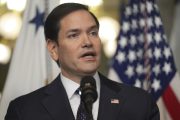
On Sunday more than 100 preachers will be speaking out on political issues and candidates in direct contravention of the IRS. And then each preacher will send a recording of their sermon to the IRS, challenging them to enforce the law. For the third year in a row, the last Sunday in September has witnessed a growing number of churches and their preachers directly confronting the IRS and daring the agency to come after them.
Sponsored by the Alliance Defense Fund, the strategy is designed to invoke enforcement of the so-called Johnson Amendment adopted by the IRS in 1954. The amendment was passed by proclamation after Johnson had been heavily criticized by Christian pastors for his personal behavior. The language of the amendment says that specifically, non-profit tax-exempt entities could not “participate in, or intervene in (including the publishing or distributing of statements), any political campaign on behalf of or in opposition to any candidate for public office.” Ever since then, “Rather than risk confrontation, many pastors have self-censored their speech, afraid to apply the teachings of Scripture to specific candidates or elections.” According to Erik Stanley, senior counsel for the ADF:
This is really a tough one for the IRS. They’re telling pastors what they can and cannot say from the pulpit. I think the IRS realizes they’ve got a serious constitutional issue here.
The ADF “is a legal alliance defending the right to hear and speak the Truth through strategy, training, funding, and direct litigation” [emphasis added], according to their website. And the effort is gaining momentum.
In 2008, Pulpit Freedom Sunday involved more than 30 churches. In 2009, 83 congregations challenged the IRS, and that number could triple this year. And the IRS took the bait from only one church in those two years, the Warroad Community Church in Warroad, Minnesota. Pastor Gus Booth had preached on moral issues as part of the Pulpit Freedom Sunday initiative, and his church underwent a nine-month investigation by the IRS. The IRS then closed the investigation, stating in its letter that “the IRS may commence a future inquiry to address the concerns described…after it resolves [a] procedural issue.”
Nothing has been heard from them since.
Stanley says that “The IRS apparently has no desire to clarify the law for churches and has studiously avoided a court confrontation over this issue…They continue to vaguely interpret the law, leav[ing] churches guessing as to what the law actually means, and enforc[ing] the Johnson Amendment through fear and intimidation.” But:
Once a federal court has an opportunity to review the Johnson Amendment, we believe it will not take long for the court to strike it down as unconstitutional. Pastors have the right to preach from their pulpits on all issues, including candidates and elections. No pastor should fear the IRS.
The ADF explains that this initiative is “a bold defense of the First Amendment’s Establishment, Free Exercise, and Free Speech clauses…[whose] purpose…is to restore the right of pastors to speak freely from the pulpit without fear of punishment by the government for doing what churches do: speak on any number of cultural and societal issues from a Biblical perspective…the issue…is over who regulates [emphasis in original] what may be said from the pulpit.”
Dave Welch, founder of the U.S. Pastor Council, encouraged pastors to participate in the Pulpit Freedom Sunday initiative, writing that “In this country, in particular, it has long been recognized…that the clergy served as the primary source of moral truth as well as religious and civil education in our founding era. The First Great Awakening served to both light and fuel the fires of liberty.” But fear of IRS confrontation has intimidated many pastors, who claim that “we should focus on evangelism and not get caught up in politics,” and “politics is not the business of the church.” The easy answer to such weak-kneed responses was expressed by Pericles, who said, “Just because you do not take an interest in politics, doesn’t mean politics won’t take an interest in you.” But Welch takes these excuses for not taking strong stands on relevant moral issues today to task:
What the founders understood was that our vote is a trust of authority given by God to another person to use that authority for God’s purpose. What most Christians today believe is that to vote is an optional act that we perform if convenient and largely driven by our own needs, desires and views.
Hence, a person who claims to be a Christian can vote for a Barack Hussein Obama, the singularly most dedicated Marxist and anti-American and most unqualified president to hold the executive office in our history. Even more common are the Christians who vote by their glaring absence — they just don’t show up….
The root cause of…these political diseases is pastors who have abdicated their sacred duty to teach the Holy Scriptures in [their] entirety with application to every sphere of the believer’s life.
Welch is optimistic that enough churches and pastors with enough good old-fashioned gumption will stand up to the IRS and force them to back down, or bring the issue to trial. He says that “If just 10 percent of our moderate-to-large-size churches will effectively execute [this plan] in their churches, we not only will make temporary political changes, but will [begin to pump] the bilge water out of the hold and set the ship back on the right course.”



